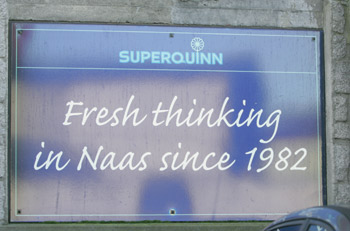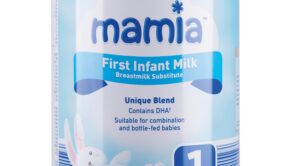What will happen to Superquinn?

The rumour mill has been turning fast this month with speculation on Superquinn’s destiny. Fionnuala Carolan examines the recent past of the old icon of Irish retailing
19 May 2011
For the past two years it’s been evident that things are not well in Superquinn and the latest Kantar Worldpanel figures for the 12 weeks ending 17 April 2011 have shown that Superquinn has lost market share again. The group now holds just 6.4% of the market down from 6.9% in 2010. The gap is closing between it and discounter Lidl (at 6.1%) and it looks like it mightn’t be too long before Superquinn is knocked out of its top four position that it has held for so long.
When requests for an interview with Superquinn chief executive, Andrew Street were denied last month, we felt that all was not well in the camp. Superquinn has since released a statement to say that it has not been “actively looking” for a buyer but it’s plain to see that if any of the other retailers made any sort of decent offer, Select Retail Holdings, the company that owns Superquinn, would bite its hand off.
Superquinn has insisted that it is firing ahead with its business plan but trade unions for the 2,500 Superquinn staff have called on senior management to meet with them as staff have become concerned for the security of their jobs.
In 2009, 400 staff lost their jobs when the Dundalk store closed and earlier this year another 100 staff became redundant when the Naas store ceased operations. The closure of Naas was a major blow as this has always been one of the flagship stores in the group. When the company sold the premises to Penneys it was said to be because they were to build a new store in Naas. However once Penneys looked to occupy the store, Superquinn never sought another premises.
Takeover speculation
There has been speculation about a possible takeover of the group for the past few years. In fact ever since Feargal Quinn sold to Select Retail Holdings in 2005 for €450m, the company has been losing its shine. The fact that in 2009, executive chairman at the time, Simon Burke said in response to questions about a possible sale of the company, that no one had come looking to buy it “in a long, long time”, didn’t exactly instill confidence in the group. He never said a sale was out of the question, indicating that it was definitely a possibility.
Musgrave is being touted as the obvious choice to buy the group and incorporate it into its SuperValu chain or even to run it as a separate entity. It has been reported that Musgrave has approached the group in recent weeks with an offer but it was not accepted.
The latest statement to come from the company said: “The board has not sought a buyer. However, the board would have to consider any meaningful approaches made by potential buyers – even if they arrive unsolicited”. So in essence if any decent bids come in, Select Retail Holdings will gratefully accept.
The speculation about who might buy the retailer, that has sales in the region of €500 million, has also included Dunnes Stores. With its new central distribution network, Dunnes would be well placed to expand and increase its presence in Leinster. Sainsbury’s, Waitrose and Asda are also possibilities. Considering the suggestion by the EU and the IMF to lift the retail size cap, one of these retailers might see this as a good opportunity to take on the 20 odd stores and increase them in size to try to compete with Tesco in certain areas. Most of the Superquinn sites have ample room for expansion and are in desirable locations.

What might have been: Former owner Feargal Quinn might have steered the company in a different direction

What might have been: Former owner Feargal Quinn might have steered the company in a different direction
Street walking
Although things have looked a bit bleak for Superquinn for a while now, there was a ray of hope last November when former Dunnes chief operating officer Andrew Street moved to Superquinn as chief executive.
Street’s appointment was expected to turn Superquinn around by stimulating sales growth. Around the same time late last year Superquinn opened a store in Dublin’s Heuston South Quarter, and its Rathgar store finally opened after almost two years lying empty. For a brief moment it seemed like things might be on the up.
However Street’s move more likely symbolised his personal issues with Dunnes. It has been said that life wasn’t exactly rosy for Street in Dunnes for a long time and it was only a matter of time before he would jump ship.
When Street came on board Simon Burke became non-executive chairman before leaving in February, to take up positions at the BBC and Mitchells and Butlers pub chain in the UK. While he is still a shareholder, Kieran Ryan, a fellow investor, has taken the position of chairman. The question is, did Burke decide to escape before it all imploded?
Hit hard by the recession
Superquinn felt the effects of the recession more keenly that the other supermarkets due to its upmarket ethos.
The discounters, Aldi and Lidl, and Tesco were able to slash prices on own brand imported products right away while Superquinn’s focus on high-end indigenous produce was to be to its detriment. Cash-strapped consumers didn’t take long to seek out value and took their business elsewhere. Superquinn was simply unable to compete with discounters on price.
Another issue was that Select Retail Holdings was made up of a group of property investors and not retailers. Had Feargal Quinn been at the helm during the recession things may have been a lot different.
The collapse of the property market, which wiped a huge chunk off the value of most of its sites, has left the group owing an estimated e250 million to the banks. You would imagine that the most favourable option for a group of property developers would be to get out with as few debts as possible than to attempt to run the group at a loss for the next number of years.



 Print
Print






Fans 0
Followers